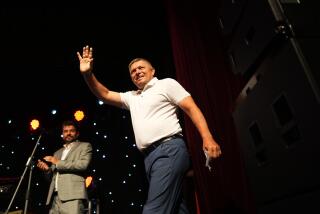Czechoslovakia’s Vaclav Havel
- Share via
I think many of us are compelled to rethink the history of political events in this country since 1970, in light of the great European awakening currently under way. Vaclav Havel and the reform movement in Czechoslovakia (“New Life for the Old World,” Op-Ed Page, Feb. 19) represent the spiritual and intellectual force that currently seeks to reunify Europe. The curious fact that this is a revolution headed by artists and playwrights lead former Sen. Gary Hart to comment that “reform and renewal come from below, not above,” and that Havel is now president of Czechoslovakia “because during its dark hour he remained the conscience of his nation” (“Do Not Await a Messiah,” Editorial Page, Feb. 17).
Yet America had a revolution and elected an actor as President, who in turn restructured the bureaucracy. Where then is our “wisdom, tolerance and understanding”? What happened to the “old European concept of human rights,” which once formed the political foundation of this country? There is no evidence of a higher moral purpose in the neglectful domestic policies which accompanied the Reagan Revolution. What then does Havel want from America?
As a matter of principle Havel does not want Europe to become a fortress, yet he sees the new Europe as smaller. How unlike the current American political manifesto which seeks, by continuing military involvement and aid to various countries on the front line of communism, to spread and defend our influence.
Havel gives credit to “human rights” as the ideal most responsible for the changes in Eastern Europe. He states that this concern started around 15 years ago, a time during which the Carter Administration, which first used the concept of progress in this area as a tool of foreign policy, introduced the term. Perhaps the real revolution in this country started in the 1960s, and for some reason took the wrong turn. But it seems to me that the fruits of the most recent American Revolution loom small indeed compared with the world one honest playwright and the people of his country look to create.
DAVID C. REUTTER
Vista
More to Read
The biggest entertainment stories
Get our big stories about Hollywood, film, television, music, arts, culture and more right in your inbox as soon as they publish.
You may occasionally receive promotional content from the Los Angeles Times.










